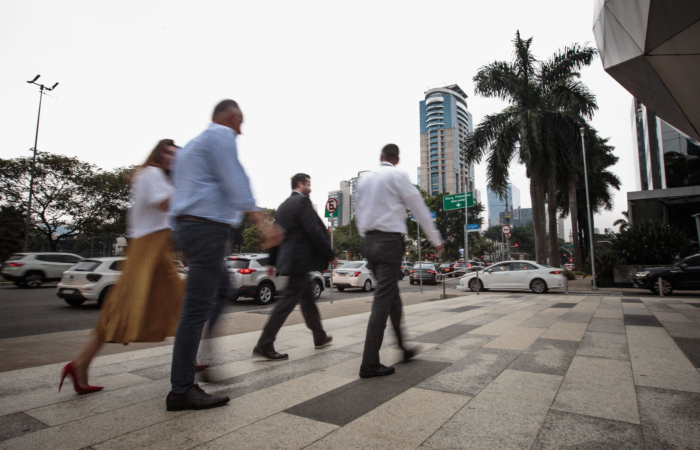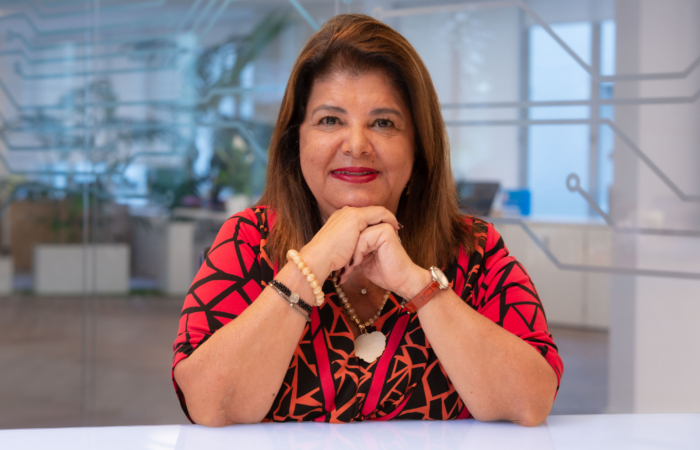PEOPLE AT THE HEART OF THE STRATEGY

O Reputation Feed spoke with Patricia Pugas, Executive Director of People Management at Magazine Luiza, for the series of interviews designed to share the vision of large Brazilian companies in relation to human resources management and the impact on reputation and business strategy in 2025.
Patricia has been heading the area at the company since February 2016, which has more than 35 thousand employees, strong cultural traits and is one of the pioneers in inclusion and diversity programs in the country. “People are the essence of this business,” he says. “The way we treat our customers impacts our results, without a doubt, but, above all, it reflects our essence; in the end, it ends up in our reputation.”
Read the main excerpts from the interview below.
COMPANY PROFILE
- Sector: Retail
- Foundation: 1957
- Performance: National
- Contributors: more than 35 thousand
- Ecosystem: conventional (physical), virtual and marketplace stores
- Physical stores: 1.246
- Adjusted EBITDA 2024: R$ 3 billion
- Source: Magalu
A survey by ANK Reputation indicated that the number one priority for senior leadership in 2025 is people management, overcoming other challenges that have a major impact on companies, such as technological updates and digital transformation. What is your assessment of this result?
It makes a lot of sense. Regarding its importance, people have always been in the consciousness of great leaders, and now they have a different relevance in the face of major transformations and the intensity with which they are happening. A recent report do World Economic Forum says that skills are becoming obsolete every two to three years. How do we deal with this within organizations? What profile do we want in a situation like this? How do I prepare these people? Today, more important than knowing is knowing how to learn. How does all this influence organizational culture and how do I reinforce and direct my cultural traits to meet these new demands and realities? I would even say that it seems very prudent for CEOs to have this concern.

“When I have engaged, committed, identified and satisfied employees, the customer will be treated better and this will also be reflected in my reputation as a company.”
How is this front considered at Magazine Luiza? Have the transformations changed the way people are viewed in the company's strategy?
We have a very strong cultural trait of adaptability, resilience, openness to new things, and tolerance for error. These are traits of our culture that we have reinforced in the digitalization process. They were already very powerful seeds due to the nature of the company, founded by a woman (Luiza Trajano Donato), in the interior of São Paulo, projected to the world by another woman (Luiza Trajano, President of the Board). We understand that digital transformation was much more a cultural process than a merely technological one. We have to have a culture of learning, not exactly telling people what, when and how to do it, but providing this environment and encouraging people to seek their own development, their own paths, in light of their opportunities and their ambitions.
“The best way to find out what a company is like is to ask the people who are inside it. Nowadays, you just have to do a search and you can quickly find the data, the opinions of employees, the way they perceive the company they work for. That’s how it (the look at people) is reflected in reputation.”
How does this approach to people contribute to Magalu’s reputation?
We have over 35,000 promoters and they are perhaps the best people to tell you what it's like to work at Magalu. And it's not just them. It's the entire community that surrounds them. When I have engaged, committed employees who identify with the company and are happy to be working there, the customer will be treated better and this will also be reflected in my reputation as a service provider or seller of a product.
Do you believe, then, that people are strategic for Magalu because customers perceive the company better? In this reasoning, does Magalu see reputation as a strategy that brings results to the business?
Internally, we strongly believe that it should only appear to be what it actually is. We are very connected to our purpose, and this is one of our major cultural reinforcement efforts. It is the way we hire, how we seek to bring in people who adhere to our purpose, our values, and how we promote. We experience these issues here and, without a doubt, this is reflected (in the result). I don't know if the best word is strategy, perhaps Magalu sees it more as its essence. People are the essence of this business. The way we treat customers impacts the results, without a doubt, but, above all, it reflects our essence. In the end, it ends up in reputation.
How does Magalu, which belongs to a sector with high turnover, workforce qualification challenges and is very sensitive to the macroeconomy, manage to maintain such a cohesive culture and people management?
It's everything I've already said about how to hire, how to look at people, but there's also something I call the virtuous circle of culture. And what does that mean to me? Very well defined, very well communicated and disciplined practices.
Who is responsible for building and maintaining the company's reputation?
The main people responsible are the leaders. We work very hard with leadership and it is a matter of setting an example. Therefore, in our rituals we set an example. Fred (Frederico Trajano, CEO of Magalu) and we, the executive director, are always present, so that the manager is also present in the store. The role of leadership, especially in a decentralized company, is fundamental, because the company is materialized in that leader, as well as in the employee. For a person from a city in the interior, who comes into my store, Magazine Luiza will be as good as the salesperson who serves them, as the manager in that store is.
Cultural practices
“We have some very strong cultural practices at Magalu. Every Monday, we have a company-wide meeting. The ritual is a ritual. We start by singing the national anthem and the Magalu anthem; we share a lot of information so that all employees are aligned and know where they are going. This is so that they can make more valuable contributions and a feedback process can take place. You can only contribute if you understand where you are going. In the end, we have our spiritual, secular moment, each in their own way. And this happens in all the company’s units, which means more than 1,500 units, in all the stores, all the distribution centers, in all the offices. This discipline is one of the cultural tools through which we ensure these alignments.” – Patricia Pugas
Therefore, the role of leadership is fundamental, not only to maintain the essence of the culture; it is reflected in the reputation itself.

“The main risk to our reputation is practices that are not aligned with what we promote and defend. Anything that deviates from this, from a practical point of view, (coming from) any of our employees, especially our leaders, is a reputational risk.”
What are the company's main reputational risks and how can they be mitigated by reputation and people management? How does this combination help reduce reputational risks?
It's hard to list, because it's a wide range. You can spend a lifetime building a reputation, and it can crumble over the smallest things. But, in short, the main risk to our reputation is practices that are not aligned with what we promote and defend. For example, Magazine Luiza is recognized as a company linked to women's causes. Anything that deviates from this, from a practical point of view, (coming from) any of our employees, especially our leaders, is a reputational risk. Our biggest concern, or rather, our job, is to ensure that our people are fully aligned with our values, beliefs, practices and causes so that there is no such dissociation.

“I'm sure that many people buy with more confidence on the Magalu website because they know what the experience is like in a physical store or have heard of or know our reputation and know how we behave.”
The company's largest revenue comes from digital sales. Could the fact that consumers interact with the store through this medium harm the company's reputation?
It's true, 70% of our sales are online, but we are an ecosystem, of which stores are a fundamental and integrated part. In the case of Magalu, our customers have an advantage over other online platforms, because if they don't have a way to talk, they'll go to a store. At some point, you have a point of contact, especially because we promote this, when we say buy on the website, pick up in store (and/or) you go to the store, choose the product and, if it is not available, you receive it at home through the website. Multichannel is one of our greatest strengths. Regardless of anything, whether physical or online, in the end, behind everything, there are people. Human warmth is embedded in all of our transactions, including digital ones.
Is Brazil better prepared to deal with emerging issues like the one Magalu brought with the black trainee program in 2021?
O our program It was one of the demonstrations of our conviction, of our purpose. Despite all the noise that was created, we remained very firm in relation to what we wanted at that time: to increase the participation of black people in our leadership. At no time was the objective to create controversy or create a social movement of the size that it generated. But, without a doubt, this consequence was positive, because it promoted a very relevant and necessary discussion. It is interesting to see how we have evolved absurdly since then on this issue in Brazil. Within Magalu itself, we have made very consistent developments, significant changes in the processes that are now completely established.
What is the role of people management in building the company's reputation in this scenario?
A company's reputation is only built through the people who work there. And the responsibility of the people management area to ensure that this works well is fundamental. It involves paying specific attention to leaders, their development, and bringing all these people on board to make things happen. Strengthening culture and communication. And, ultimately, lending people's perspective to strategic discussions and, through this perspective, highlighting what is needed to have a better environment and a happier company. Only then will we have a better perceived company, and therefore, a stronger reputation.
Christianne Schmitt is editor of the Reputation Feed
Christianne.schmitt@ankreputation.com.br
- Click to read or revisit, in the series People at the Center of Management, the interviews with Márcia Costa, VP of People Management at Aegea, and Ricardo Burgos, VP of People and Security at Amil Group



